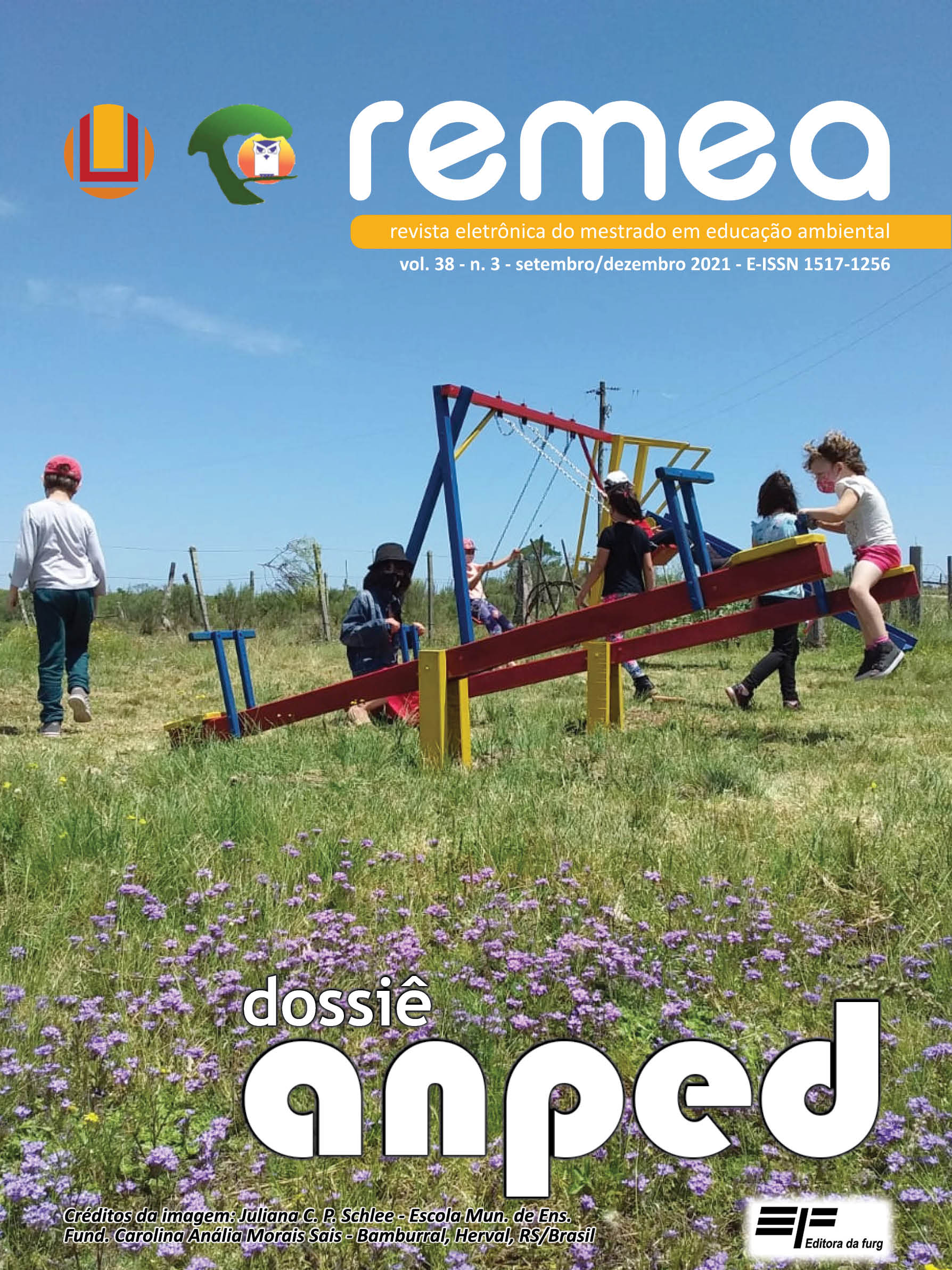Formación de valores personales prosociales en el entorno escolar
DOI:
https://doi.org/10.14295/remea.v38i3.13491Palabras clave:
Valores personales, formación de valores, educación ambientalResumen
Los conflictos personales y socioambientales se han manifestado cada vez más en el ambiente escolar, lo que resulta en amenazas a la integridad de los involucrados y daños al patrimonio material e inmaterial. Este estudio investigó los valores personales de los estudiantes de una escuela pública del Distrito Federal, a fin de formar valores orientados al bien común. Inicialmente, una encuesta con todos los estudiantes de la escuela (N = 980; 51,2% niñas; edad media = 13 años) mapeó los valores e identificó los principales conflictos existentes; luego, la clase con mayor índice de valores individualistas y relatos de conflicto fue seleccionada para los talleres experienciales enfocados en la formación de valores prosociales. Finalmente, una encuesta combinada con círculos de conversación y entrevistas evaluó los cambios en los valores de estos estudiantes. Los resultados revelaron la manifestación de valores que trascienden los intereses egoístas y un ambiente escolar más solidario y colaborativo, destacando el potencial de este proceso de formación para la transformación de las relaciones interpersonales y socioambientales.
Descargas
Citas
AELENEI, Cristina; DARNON, Céline; MARTINOT, Delphine. Boys, girls, and the school cultural environment: Teachers’ judgment and students’ values, The Journal of Social Psychology, v. 157, n. 5, p. 556-570, 2017.http://dx.doi.org/10.1080/00224545.2016.1243514.
BENISH-WEISMAN, Maya. The Interplay Between Values and Aggression in Adolescence: A Longitudinal Study. Developmental Psychology, v. 51, n. 5, p. 677– 687, 2015. http://dx.doi.org/10.1037/dev0000015.
BENISH-WEISMAN, Maya; DANIEL, Ella; MCDONALD, Kristina L. Values and Adolescent Self-Esteem: The Role of Value Content and Congruence with Classmates. European Journal of Social Psychology, v. 50, n. 1, may, 2019.https://doi.org/10.1002/ejsp.2602.
BENISH-WEISMAN, Maya et al. The relations between values and prosocial behavior among children: The moderating role of age. Personality and Individual Differences, v. 141, p. 241–247, 2019. https://doi.org/10.1016/j.paid.2019.01.019.
BILSKY, Wolfgang. A estrutura de valores: sua estabilidade para além de instrumentos, teorias, idade e culturas. Revista de Administração Mackenzie, v. 10, nº 3. São Paulo, maio/junho, 2009. Disponível em: Acesso: 20 de junho de 2014.
BOJANOWSKA, Agnieszka; URBANSKA, Beata. Individual values and well-being: The moderating role of personality traits. International Journal of Psychology, 2021. https://DOI.org/10.1002/ijop.12751.
CALLAGHAN, Chris Willian. Do benevolent and altruistic supervisors have higher postgraduate supervision throughput? The contributions of individual motivational values to south african postgraduate supervision throughput. South African Journal of Higher Education. V. 34, n. 6, p. 27-51, 2020. https://dx.doi.org/10.20853/34-6-3888.
CARVALHO, Isabel Cristina de Moura. Em direção ao mundo da vida: interdisciplinaridade e educação ambiental / Conceitos para se fazer educação ambiental. Brasília: IPÊ – Instituto de Pesquisas Ecológicas, 1998. Cadernos de educação ambiental 2.
CARVALHO, Isabel Cristina de Moura. Educação ambiental: a formação do sujeito ecológico. São Paulo: Cortêz, 5ª.edição, 2011.
CARVALHO, Mirelly Gabrielly Mendes de; SILVA JUNIOR, Milton Gonçalves da.Análise da transversalidade da educação ambiental na fase II do ensino fundamental da rede pública municipal e estadual de Goiânia-GO. Revista Eletrônica de Educação da Faculdade Araguaia, v. 5, p.1- 13, 2014.
CAVAGNARO, Elena et al. Profiling for sustainable tourism: young travellers’ selftranscendence values and motivations. European Journal of Tourism Research, v. 28, 2810. 2021.
CORRÊA, Rosângela Azevedo. Cultura, educação para, sobre e na paz. In: MILANI, Feizi M.; JESUS, Rita de Cássia D. P. (Orgs.) Cultura da paz: estratégias, mapas e bússolas. Salvador: INPAZ, 2003, PP. 97-141.
COSTA, Marília R. Maia. Valores e práticas no dia-a-dia da sala de aula. Rio de Janeiro: Wak editora, 2006.
CRESWELL, John W. Projeto de pesquisa: métodos qualitativos, quantitativos e misto. Tradução: Magda Lopes. 3ª. ed. Porto Alegre: Artmed, 2010.
DANSA, Claudia; PATO, Claudia; CORRÊA, Rosângela. Educação Ambiental e Ecologia Humana: Contribuições para um debate. In: MARQUES, Juracy (org.). Ecologias Humanas. 1. ed. Feira de Santana: Universidade Estadual de Feira de Santana, 2014. p. 207–216.
DE GROOT, Judith I. M.; STEG, Linda. Morality and Prosocial Behavior: The Role of Awareness, Responsibility, and Norms in the Norm Activation Model Morality and Prosocial Behavior: The Role of Awareness, Responsibility, and Norms in the Norm Activation Model. The Journal of Social Psychology, [S. l.], v. 149, n. 4, p. 425–449, 2009. Disponível em: https://doi.org/10.3200/SOCP.149.4.425-449doi.org/10.3200/SOCP.149.4.425-449
DJONKO-MOORE, Cara et al. Using Culturally Relevant Experiential Education to Enhance Urban Children’s Knowledge and Engagement in Science, Journal of Experiential Education , v. 41, n. 2, p. 137–153, 2018. https://DOI.org/10.1177/1053825917742164.
FORNARA, Ferdinando et al. The extended Value-Belief-Norm theory predicts committed action for nature and biodiversity in Europe. Environmental Impact Assessment Review, [S. l.], v. 81, n. May 2019, p. 106338, 2020. Disponível em: https://doi.org/10.1016/j.eiar.2019.106338
JAGERS, Sverker C.; MARTINSSON, Johan; MATTI, Simon. The Environmental Psychology of the Ecological Citizen: Comparing Competing Models of Pro-Environmental Behavior*. Social Science Quarterly, [S. l.], v. 97, n. 5, p. 1005–1022, 2016. Disponível em: https://doi.org/10.1111/ssqu.12313.
KARA, Ahmet; TEKIN, Hatice. The Investigation of Human Values Perceived from the Use of Social Media of Secondary School Students. Universal Journal of Educational Research, v. 5, n. 11, p. 1912-1925, 2017.http://DOI.org/10.13189/ujer.2017.051108.
KNAFO, Ariel; DANIEL, Ella; KHOURY-KASSABRI, Mona. Values as Protective Factors Against Violent Behavior in Jewish and Arab High Schools in Israel. Child Development, v. 79, n. 3, p. 652 – 667, may/june, 2008.
LUMBER, Ryan; RICHARDSON, Miles; SHEFFIELD, David. Beyond knowing nature: Contact, emotion, compassion, meaning, and beauty are pathways to nature connection. PLoS ONE, [S. l.], v. 12, n. 5, p. 1–24, 2017. Disponível em: https://doi.org/10.1371/journal.pone.0177186
MONDAL, Bhim Chandra. Inculcating Human Values among School Students through Effective Teaching. Journal of Social Sciences, v. 13, n. 2, p. 102-107, 2017. https://DOI.org/10.3844/jssp.2017.102.107.
PATO, Claudia. Valores ecológicos. In: CAVALCANTE, Sylvia e ELALI, Gleice A . (orgs)Temas básicos em Psicologia Ambiental. Petrópolis, RJ: Vozes, 2011.
PAVIANI, Neires Maria Soldatelli; FONTANA, Niura Maria. Oficinas pedagógicas: relato de uma experiência. Conjectura, Caxias do Sul, v. 14, n. 2, p. 77-88, maio/ago. 2009. Disponível em http://www.ucs.br/etc/revistas/index.php/conjectura/article/viewFile/16/15. Acesso em 10 jul 2021.
REIS, Geilson de Arruda; SCHWERTNER, Suzana Feldens. Educação Ambiental no Ensino Fundamental: aprendizagens estudantis e seus reflexos para além da escola. Revista Diálogo Educacional, Curitiba, v. 21, n. 69, p. 957-984, abr./jun. 2021. Disponível em http://dx.doi.org/10.7213/1981-416X.21.069.AO08.
ROKEACH, Milton. The nature of human values. New York (USA): Free Press, 1973.
SCHWARTZ, Shalom H. Validade e aplicabilidade da Teoria de Valores. In: TAMAYO, Álvaro e PORTO, Juliana Barreiros (orgs.) Valores e comportamento nas organizações. Petrópolis, RJ: Vozes. 2005.
SCHWARTZ, Shalom H. et al. Universals in the content and structure of values: theoretical advances and empirical tests in 20 countries. In: ZANNA (org.) Advances experimental social psychology, v. 25, p. 1-64, 1992. San Diego, CA Academic Press.
Descargas
Publicado
Cómo citar
Número
Sección
Licencia

Esta obra está bajo una licencia internacional Creative Commons Atribución-NoComercial-CompartirIgual 4.0.










